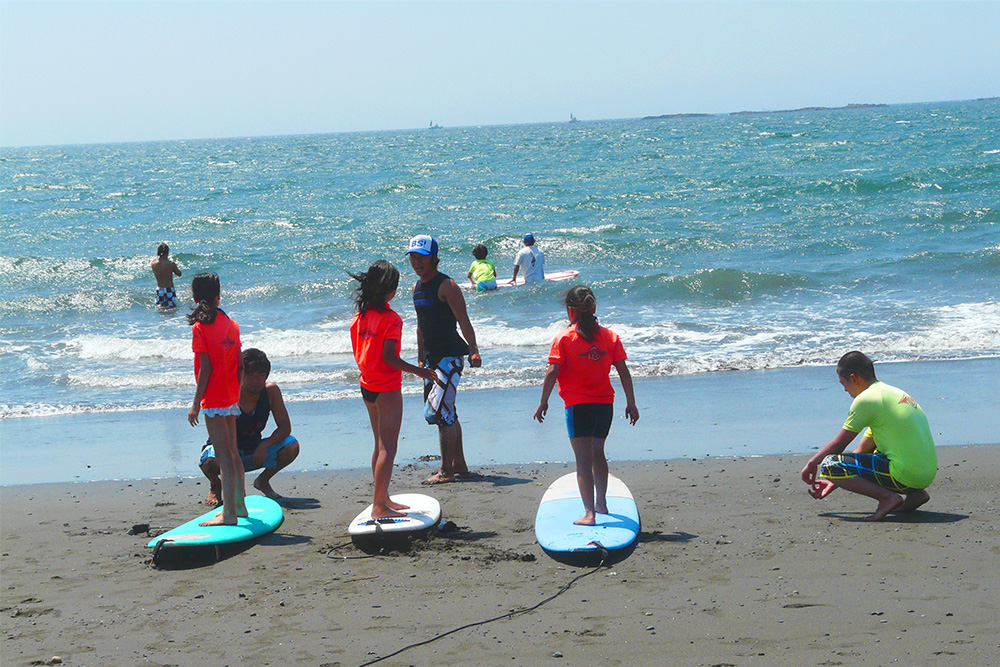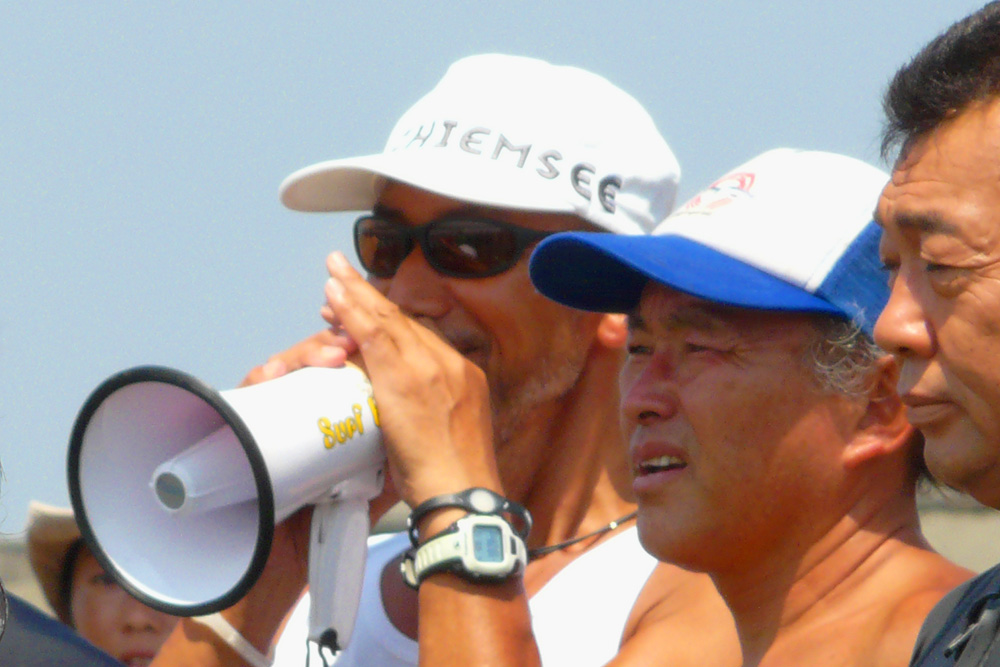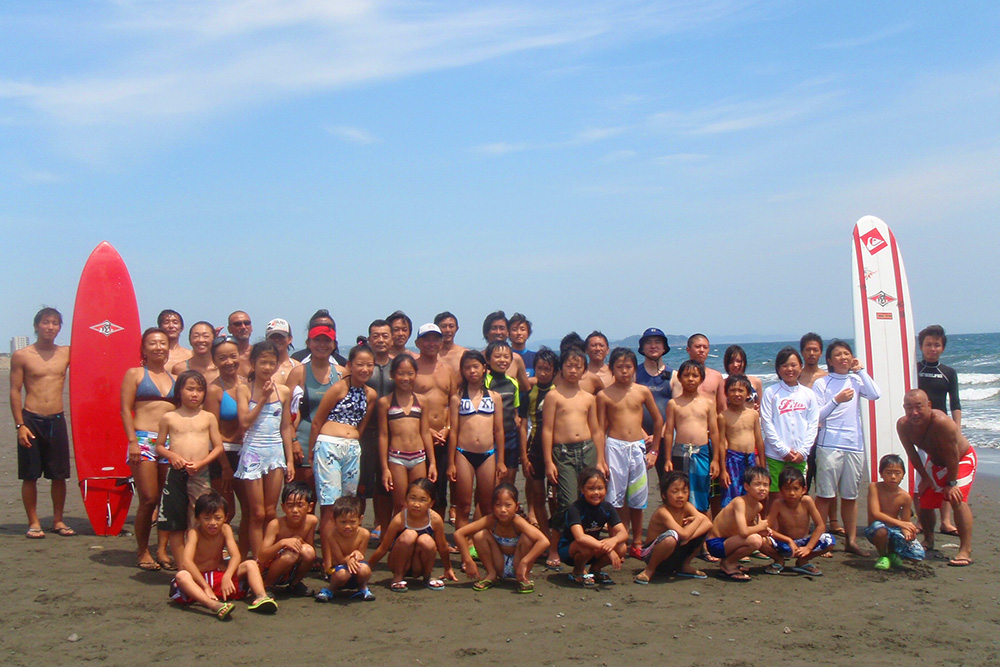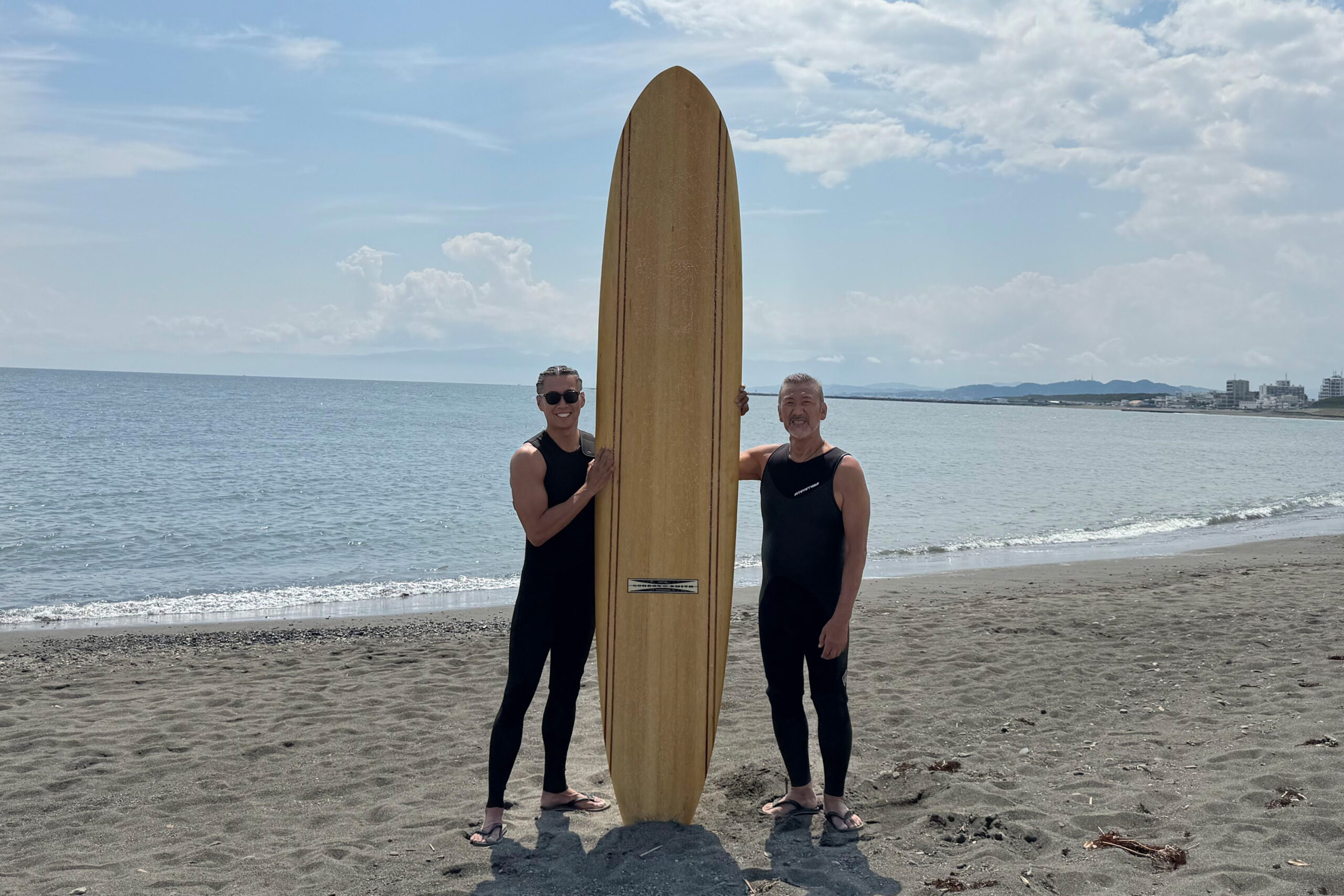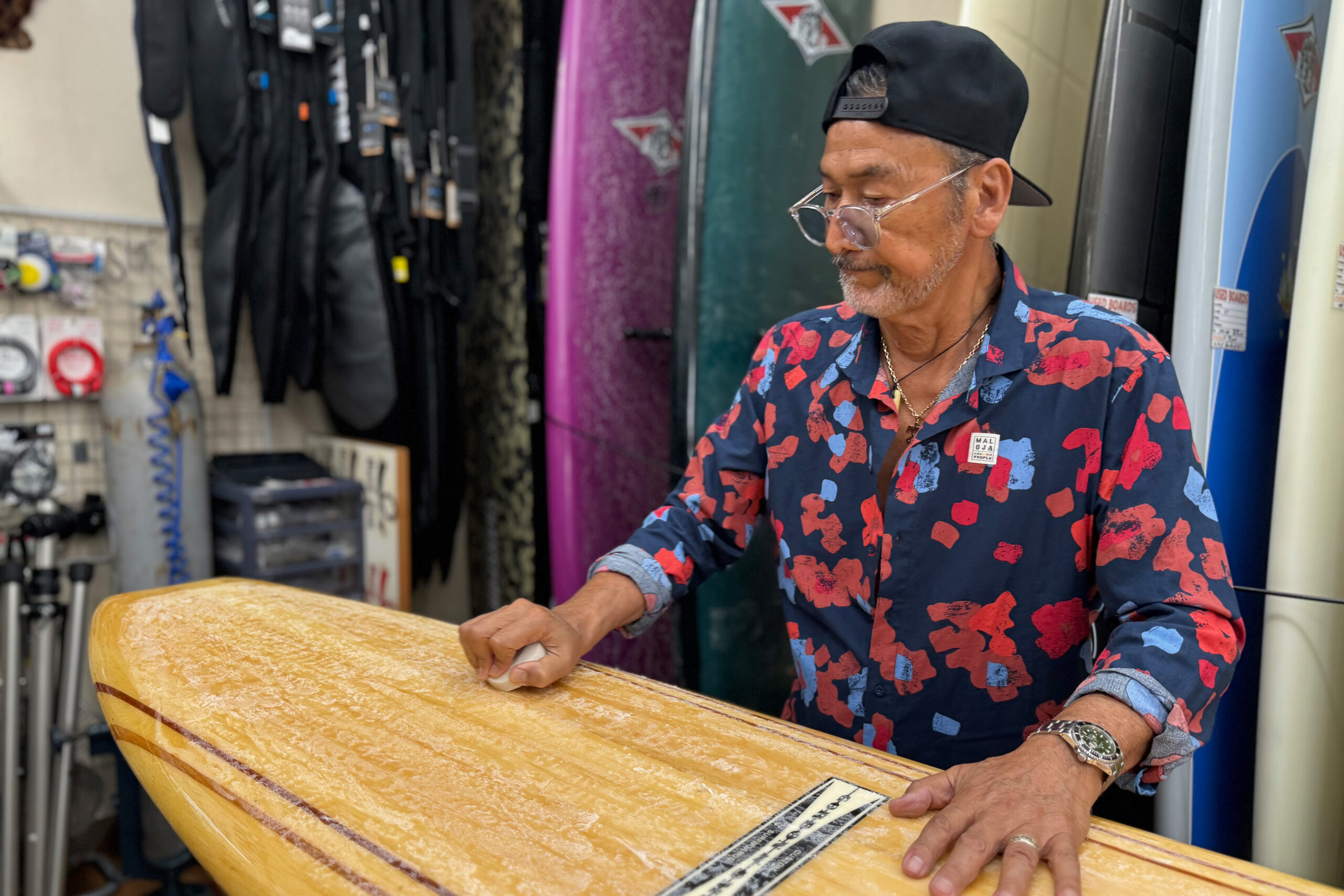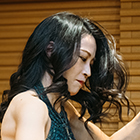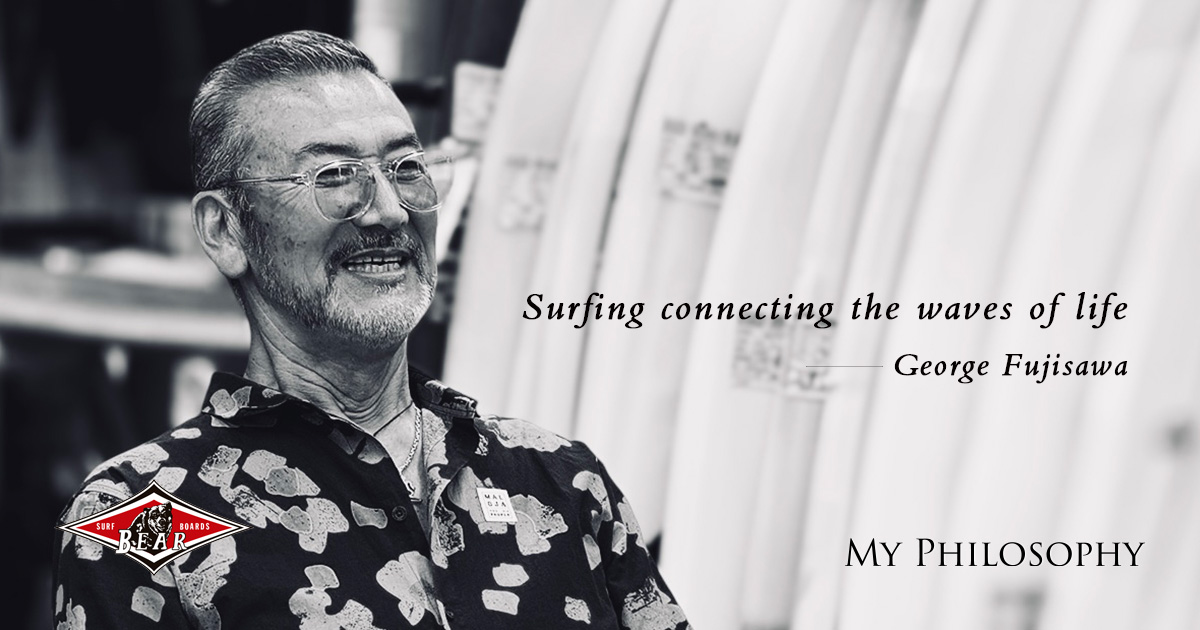
At the age of 14, George Fujisawa moved to Hawaii and encountered surfing. His surfing career began in Hawaii and eventually became a major influence on the Japanese surfing scene. As we celebrate our 50th anniversary next year, we present the story of his continued support of “Fluid Power Surf Craft” and his contribution to the development of surfing culture.
Profile
Vol.114 George Fujisawa
George Fujisawa, President of Fluid Power, Ltd.
Born on October 6, 1950 in Fuchu City, Tokyo, Japan. 1965, at the age of 14, just after graduating from junior high school, he went to Hawaii and started surfing. 1973, he became one of the starting members of Japanese pro surfers. 1974, he opened a surf shop named “Surfbum Surf Shop” in Chigasaki, Japan., Later the name changed to“Fluid Power Surf Craft”.
In 1978, he became certified as the A Pro Surfer of the Japan Professional Surfing Association (JPSA). Only 6 surfers were selected as the members of the first class. He is known as one of the legendary surfers in Japan for his efforts to popularize surfing in Japan through the operation of his surf shop , and for supporting the path to the sister city agreement between Chigasaki and Honolulu.
Encounter with Surfing
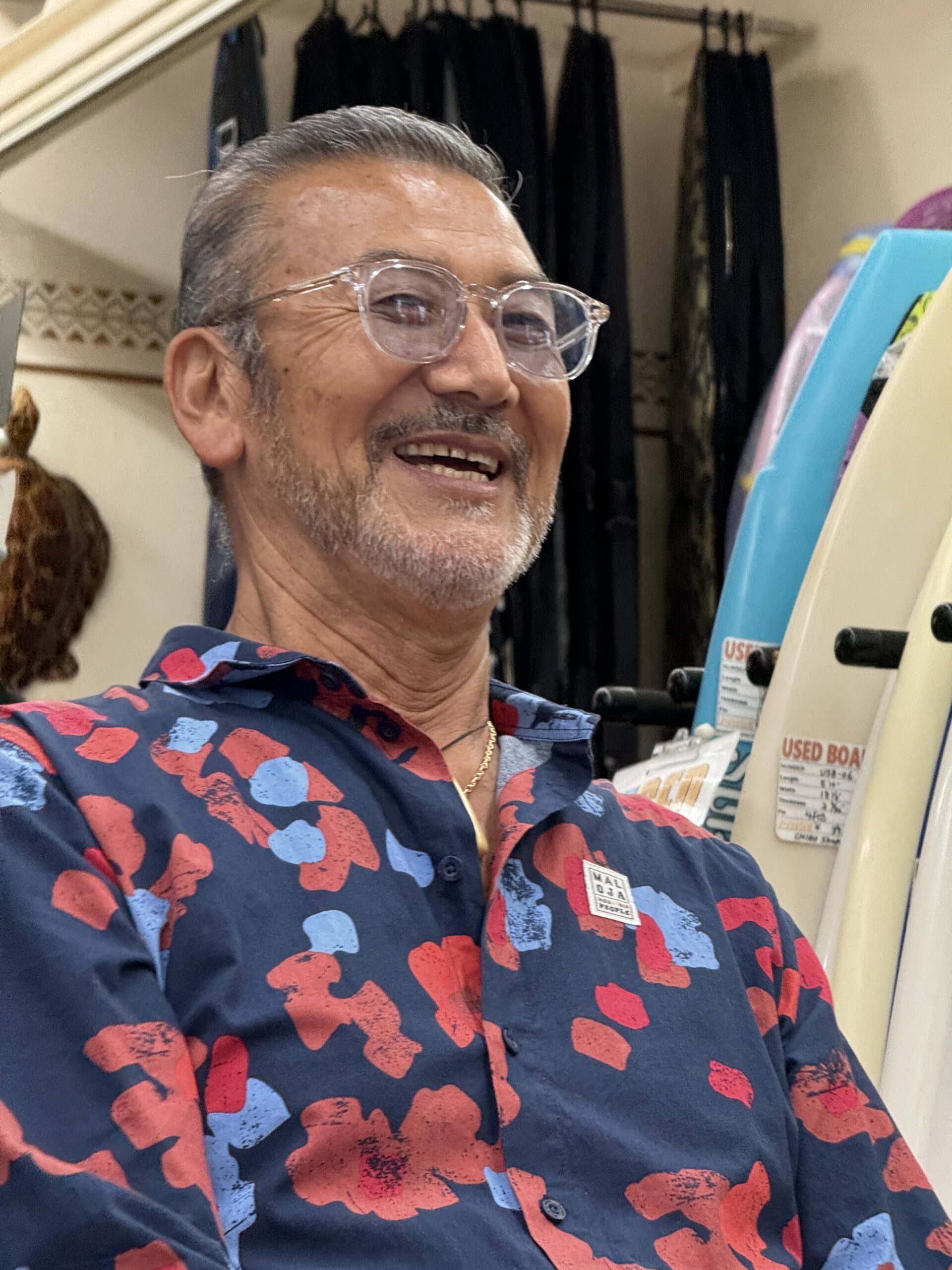 I moved to Hawaii when I was 14 years old, fresh out of middle school. My mother’s older sister had moved to Hawaii after getting married, and my mother made the decision to send me to live with my aunt out of concern for my future. In Hawaii, I helped wash dishes at my aunt’s restaurant every morning before school as a way to return the favor of being allowed to live there. After school, my friends would pick me up in front of the school and take me straight to the beach. I spent my first year surfing 365 days a year, every day.
At first, I was bored in Hawaii because of the unfamiliar environment. However, when my cousin’s friend took me to the beach, I was immediately attracted to the allure of surfing. The feeling of being at one with nature and the sense of freedom that comes with riding the waves was too wonderful to describe.
The most attractive thing about surfing is that there is no admission fee. Because I grew up in a single mother family, I was not wealthy.I had to earn pocket money by delivering milk and newspapers to buy a bicycle when I was in elementary school in Japan. Surfing was a valuable pastime that I could easily enjoy. I bought my first surfboard for about 36,000 yen, which was a big investment for me at that time.
I moved to Hawaii when I was 14 years old, fresh out of middle school. My mother’s older sister had moved to Hawaii after getting married, and my mother made the decision to send me to live with my aunt out of concern for my future. In Hawaii, I helped wash dishes at my aunt’s restaurant every morning before school as a way to return the favor of being allowed to live there. After school, my friends would pick me up in front of the school and take me straight to the beach. I spent my first year surfing 365 days a year, every day.
At first, I was bored in Hawaii because of the unfamiliar environment. However, when my cousin’s friend took me to the beach, I was immediately attracted to the allure of surfing. The feeling of being at one with nature and the sense of freedom that comes with riding the waves was too wonderful to describe.
The most attractive thing about surfing is that there is no admission fee. Because I grew up in a single mother family, I was not wealthy.I had to earn pocket money by delivering milk and newspapers to buy a bicycle when I was in elementary school in Japan. Surfing was a valuable pastime that I could easily enjoy. I bought my first surfboard for about 36,000 yen, which was a big investment for me at that time.
Overcoming the Language Barrier with Movies
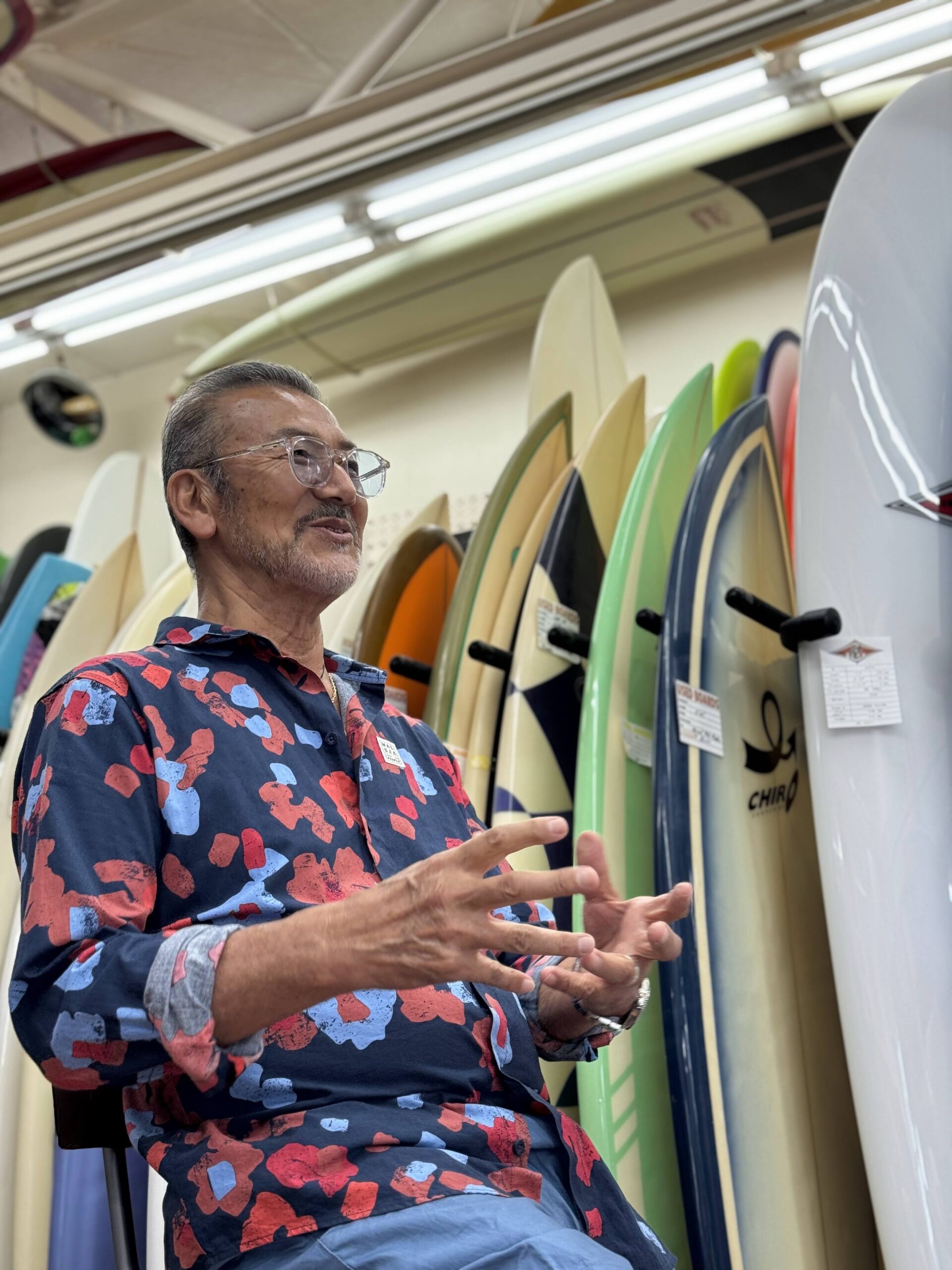 When I first came to Hawaii, I could not speak English at all and often felt lonely. I struggled to learn English while attending school. In a time when there was no Internet, I had very little exposure to Japanese, so conversations with friends I made through surfing helped me immensely in overcoming the English barrier.
In addition, movies were also a great way to learn English. By going to the cinema, watching movies, and listening to dialogues and expressions repeatedly, I began to understand and speak English. Movies were not just entertainment, but served as a valuable learning tool. As a result, I developed my listening skills through movies and my speaking skills through conversations with friends.
As I watched more and more movies, I gradually came to love movies more and more, and I even developed a dream of making movies someday. Movies have the power to appeal to people’s hearts, and I came to think that I would like to create that power with my own hands and inspire many people.
When I first came to Hawaii, I could not speak English at all and often felt lonely. I struggled to learn English while attending school. In a time when there was no Internet, I had very little exposure to Japanese, so conversations with friends I made through surfing helped me immensely in overcoming the English barrier.
In addition, movies were also a great way to learn English. By going to the cinema, watching movies, and listening to dialogues and expressions repeatedly, I began to understand and speak English. Movies were not just entertainment, but served as a valuable learning tool. As a result, I developed my listening skills through movies and my speaking skills through conversations with friends.
As I watched more and more movies, I gradually came to love movies more and more, and I even developed a dream of making movies someday. Movies have the power to appeal to people’s hearts, and I came to think that I would like to create that power with my own hands and inspire many people.
Encountering Surfing and Connecting with People
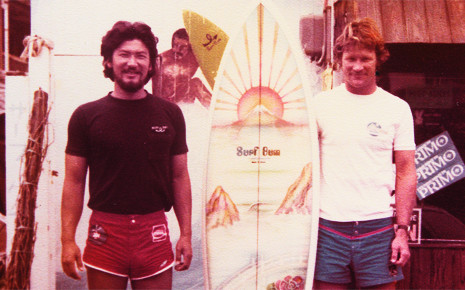
- A photo with “Randy Rarick,” who changed my life. (In front of the “Fluid Power Surf Craft”</> opening)

- “Fluid Power Surf Craft” (1965)
Fluid Power Surf Craft
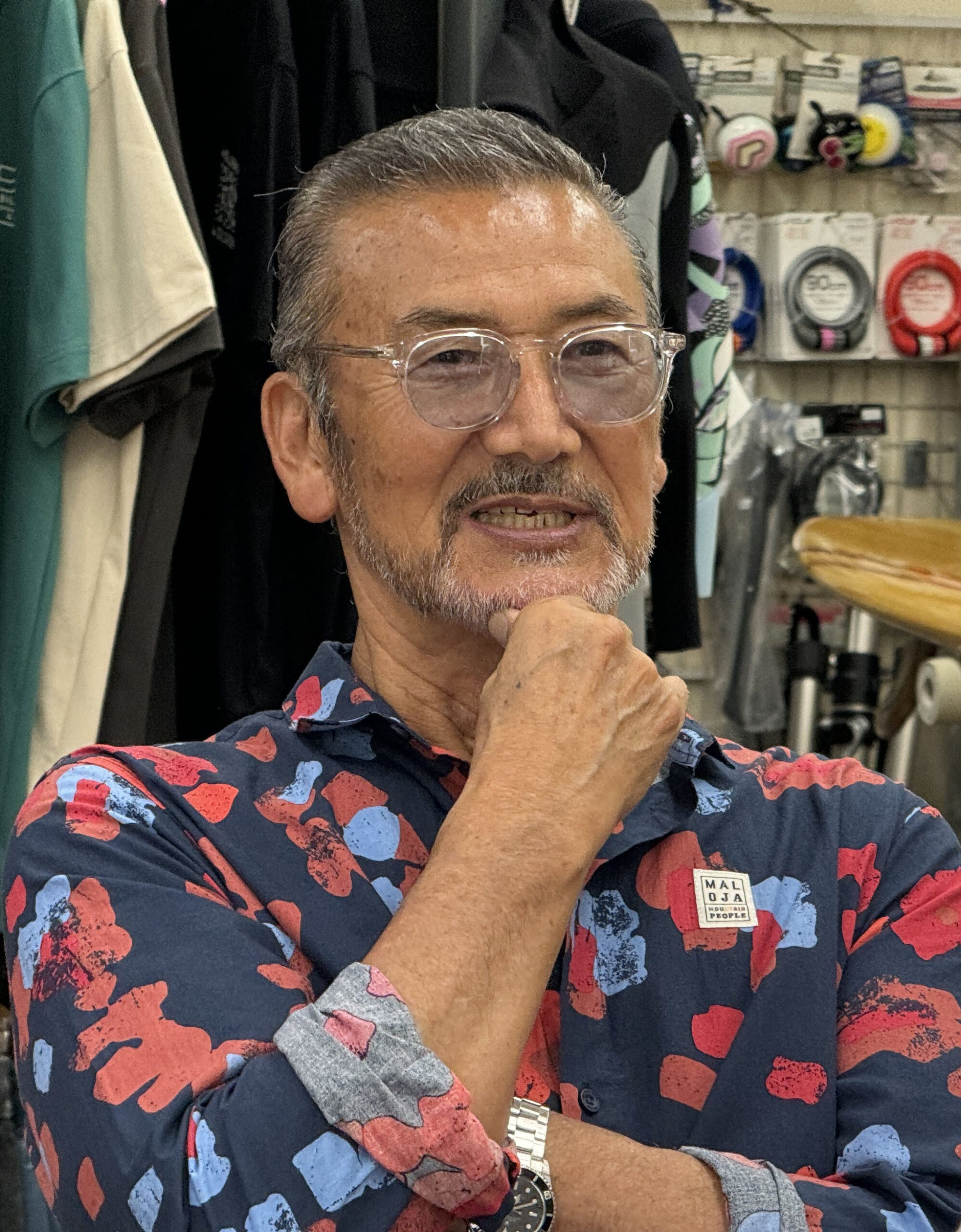 Fluid Power Surf Craft is a treasure filled with my passion. The name of the shop is a combination of the words “Fluid” and “Power,” which evokes the movement and waves of surfing, while “Surf Craft” is my desire to promote surfing by hand. The first shop name, “Surf Bum,” was changed on the advice of Randy Rarick. He pointed out that the word “Bum” had a strong image of wanderer and slackers, so I chose a name with more positive connotations.
I made the decision to open a shop in Chigasaki because many of the Japanese surfers and friends I met in Hawaii lived in Chigasaki. Although I had some experience in surfing, I was worried about running the shop , but I took on the challenge with a strong determination not to let it fall apart at any cost. I am glad I made the decision to open it. Through “Fluid Power Surf Craft,” I connected with many people, and these connections are my assets. The relationships I built through surfing and the shop continue to be a great source of support for me.
My wife has supported the “Fluid Power Surf Craft” for 49 years. She is also known as a hula dancer, and as a professional manager, she has supported the shop behind the scenes and provided an environment where I could enjoy surfing freely. Moreover, with her support, I am able to concentrate on running the shop , which has led to the great success.Fluid Power Surf Craft, which will celebrate its 50th anniversary next year in 2025, is the result of what I have built together with my wife.I hope to continue to share the beauty of surfing and the importance of human relationships with as many people as possible.
Fluid Power Surf Craft is a treasure filled with my passion. The name of the shop is a combination of the words “Fluid” and “Power,” which evokes the movement and waves of surfing, while “Surf Craft” is my desire to promote surfing by hand. The first shop name, “Surf Bum,” was changed on the advice of Randy Rarick. He pointed out that the word “Bum” had a strong image of wanderer and slackers, so I chose a name with more positive connotations.
I made the decision to open a shop in Chigasaki because many of the Japanese surfers and friends I met in Hawaii lived in Chigasaki. Although I had some experience in surfing, I was worried about running the shop , but I took on the challenge with a strong determination not to let it fall apart at any cost. I am glad I made the decision to open it. Through “Fluid Power Surf Craft,” I connected with many people, and these connections are my assets. The relationships I built through surfing and the shop continue to be a great source of support for me.
My wife has supported the “Fluid Power Surf Craft” for 49 years. She is also known as a hula dancer, and as a professional manager, she has supported the shop behind the scenes and provided an environment where I could enjoy surfing freely. Moreover, with her support, I am able to concentrate on running the shop , which has led to the great success.Fluid Power Surf Craft, which will celebrate its 50th anniversary next year in 2025, is the result of what I have built together with my wife.I hope to continue to share the beauty of surfing and the importance of human relationships with as many people as possible.
Passing on to the Next Generation
Fluid Power Surf Craft, used to offer surfing classes for elementary school children. For about 15 years, starting in 2000, these classes were held as part of the local elementary school’s summer curriculum, and were a popular opportunity for children to face nature through surfing and learn the skills to ride waves with confidence.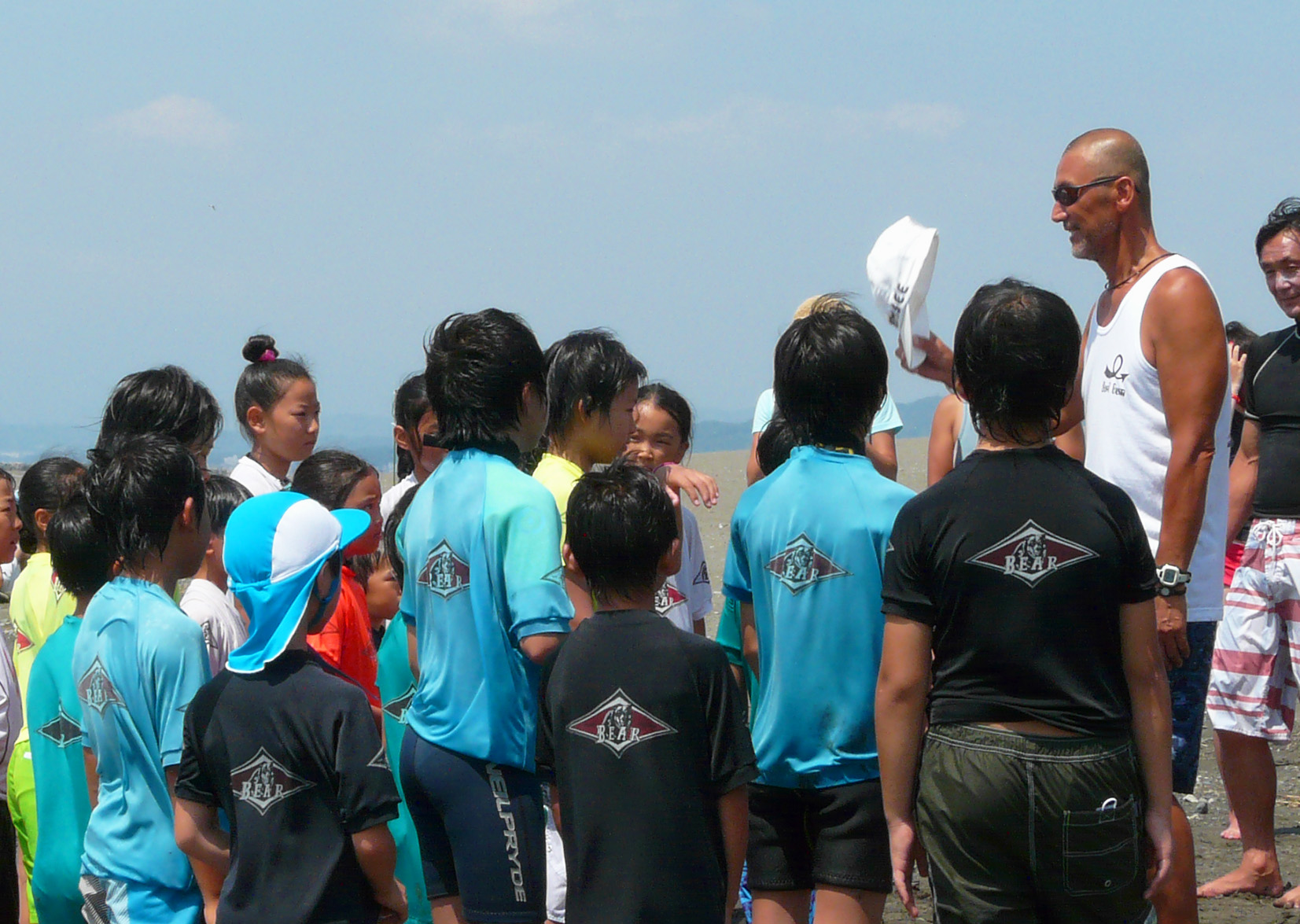
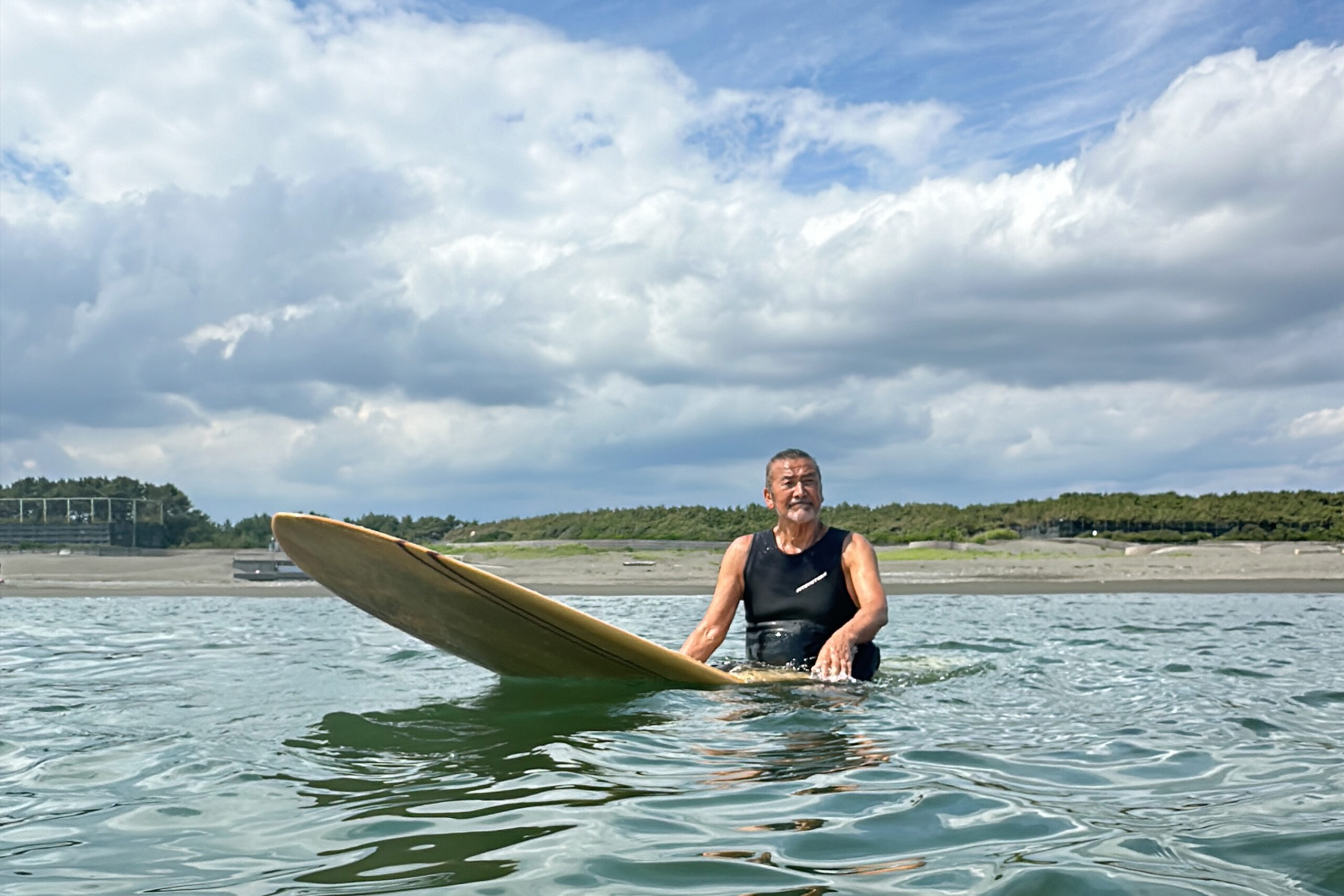
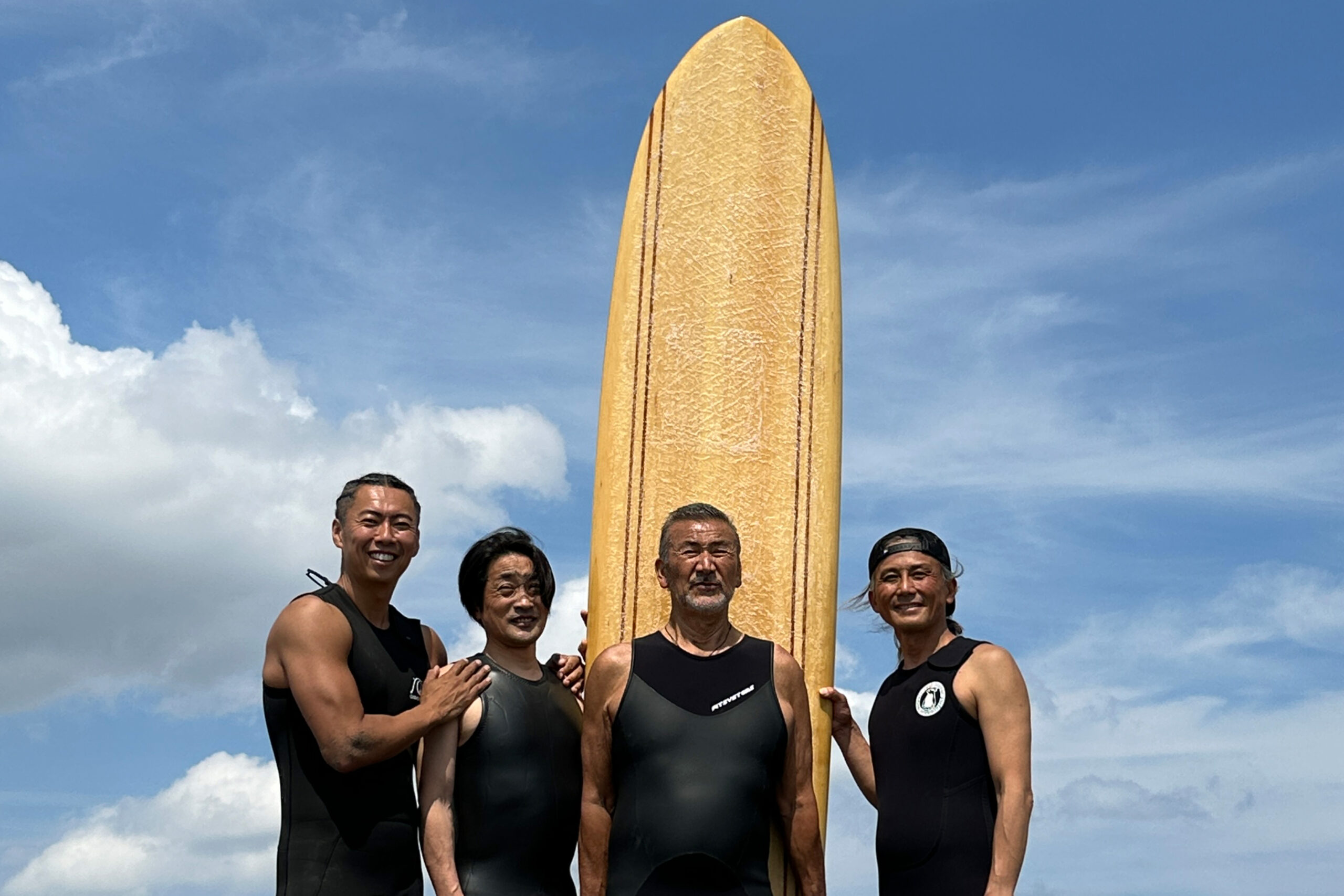 Through this interview, I had a precious opportunity to reflect on my surfing life. I feel once again that the connections I have made with the many people I have met through surfing and surf shops are the most important assets in my life.
During my interview with DK Sugiyama, I was extremely impressed by his activeness and “American style” energy. His youthfulness and continued passion were a great inspiration to me, and he also presented me with an antique board from Gordon&Smith, and our first ride together was a great feeling. I will take good care of this board together with everyone in the community. We will continue to share the appeal of surfing with many people and strive to further expand the connections between people.
Through this interview, I had a precious opportunity to reflect on my surfing life. I feel once again that the connections I have made with the many people I have met through surfing and surf shops are the most important assets in my life.
During my interview with DK Sugiyama, I was extremely impressed by his activeness and “American style” energy. His youthfulness and continued passion were a great inspiration to me, and he also presented me with an antique board from Gordon&Smith, and our first ride together was a great feeling. I will take good care of this board together with everyone in the community. We will continue to share the appeal of surfing with many people and strive to further expand the connections between people.
George Fujisawa, President of Fluid Power, Ltd.
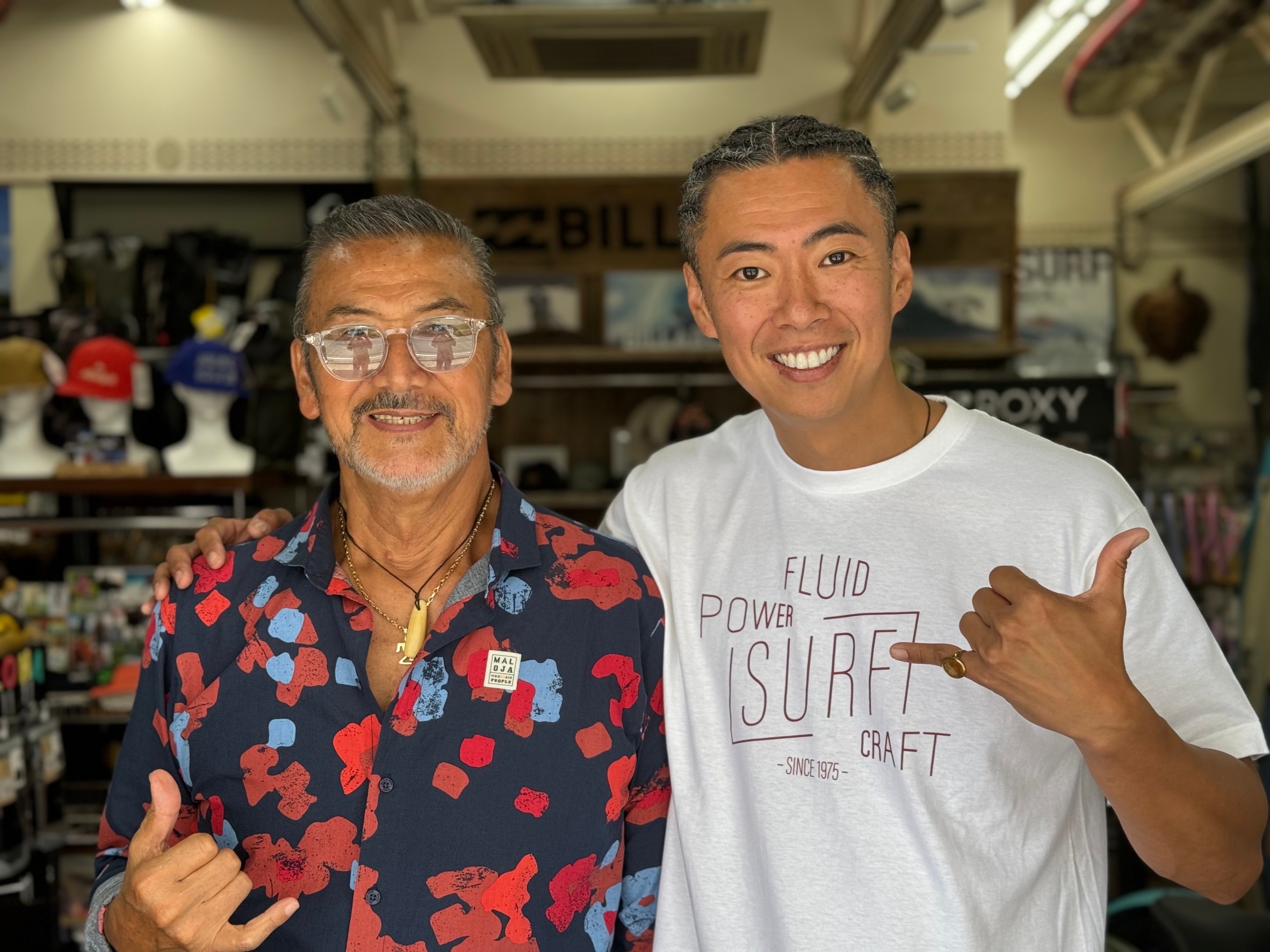 Geore’s life has been shaped by his encounters with surfing and the people he has met. He moved to Hawaii at the age of 14 and discovered the appeal of surfing, and later had a fateful encounter with Randy Rarick, which had a huge impact on the Japanese surfing scene. For 50 years, he has supported “Fluid Power Surfcraft”, and has worked hard to spread the culture of surfing.
Behind his success are the support of his wife and the deep bonds he has formed with many people. These connections, built through surfing, are undoubtedly his greatest asset and have enriched his life. George’s story is not just about his surfing skills or business success, but also about how important relationships with other people are.
From now on, I will call him “Boss George” 🌊 I will continue to support George as he builds bonds with more and more people and spreads the culture of surfing even further. I’m looking forward to next year’s 50th anniversary party!
Geore’s life has been shaped by his encounters with surfing and the people he has met. He moved to Hawaii at the age of 14 and discovered the appeal of surfing, and later had a fateful encounter with Randy Rarick, which had a huge impact on the Japanese surfing scene. For 50 years, he has supported “Fluid Power Surfcraft”, and has worked hard to spread the culture of surfing.
Behind his success are the support of his wife and the deep bonds he has formed with many people. These connections, built through surfing, are undoubtedly his greatest asset and have enriched his life. George’s story is not just about his surfing skills or business success, but also about how important relationships with other people are.
From now on, I will call him “Boss George” 🌊 I will continue to support George as he builds bonds with more and more people and spreads the culture of surfing even further. I’m looking forward to next year’s 50th anniversary party!
DK Sugiyama, Editor-in-Chief of “My Philosophy”
Fluid Power Surf Craft
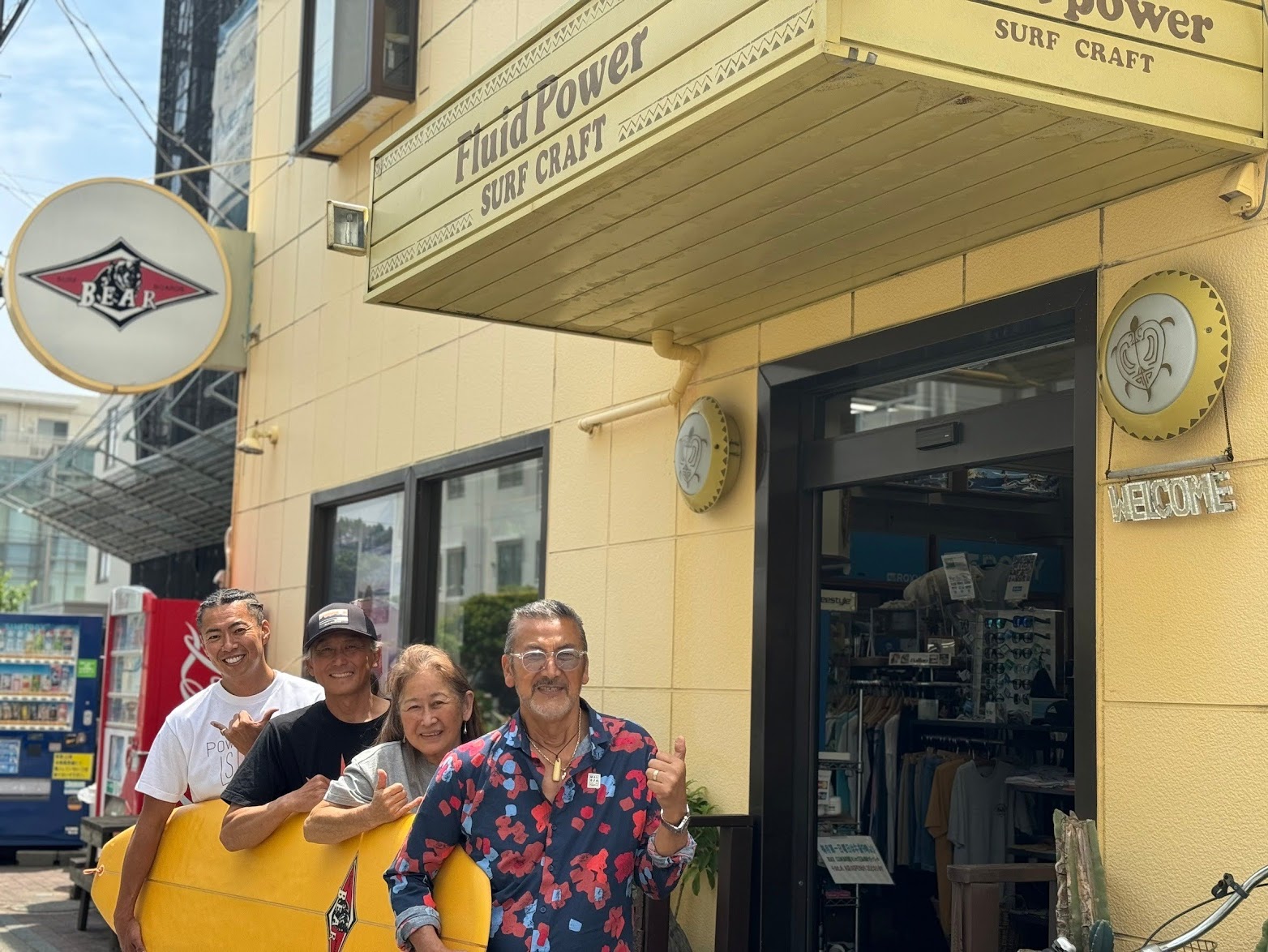
At George Fujisawa’s surf shop, you can experience the appeal of surfing, which began with his encounter in Hawaii in 1965. Please try out the surf school at this shop, which is filled with passion and love. You can enjoy real surfing. DK Sugiyama has improved his surfing under the guidance of professional surfer Takuji Makino. Fluid Power Surf Craft 1-21-1 Higashikaigan Minami, Chigasaki City, Kanagawa Prefecture 253-0054 Opening hours: 9:00 – 19:00 Parking: 3 cars Closed: Tuesdays TEL: +81-467-86-6944 FAX: +81-467-86-2888
May 2024, Interviewed at Fluid Power Surf Craft ,Interview and editing by: DK Sugiyama Project Manager: Chiho Ando Written by Eri Shibata (Assistant Editor-in-Chief, “My Philosophy”) Translation: Alex Queen Photography: Jotaro Sugiyama




